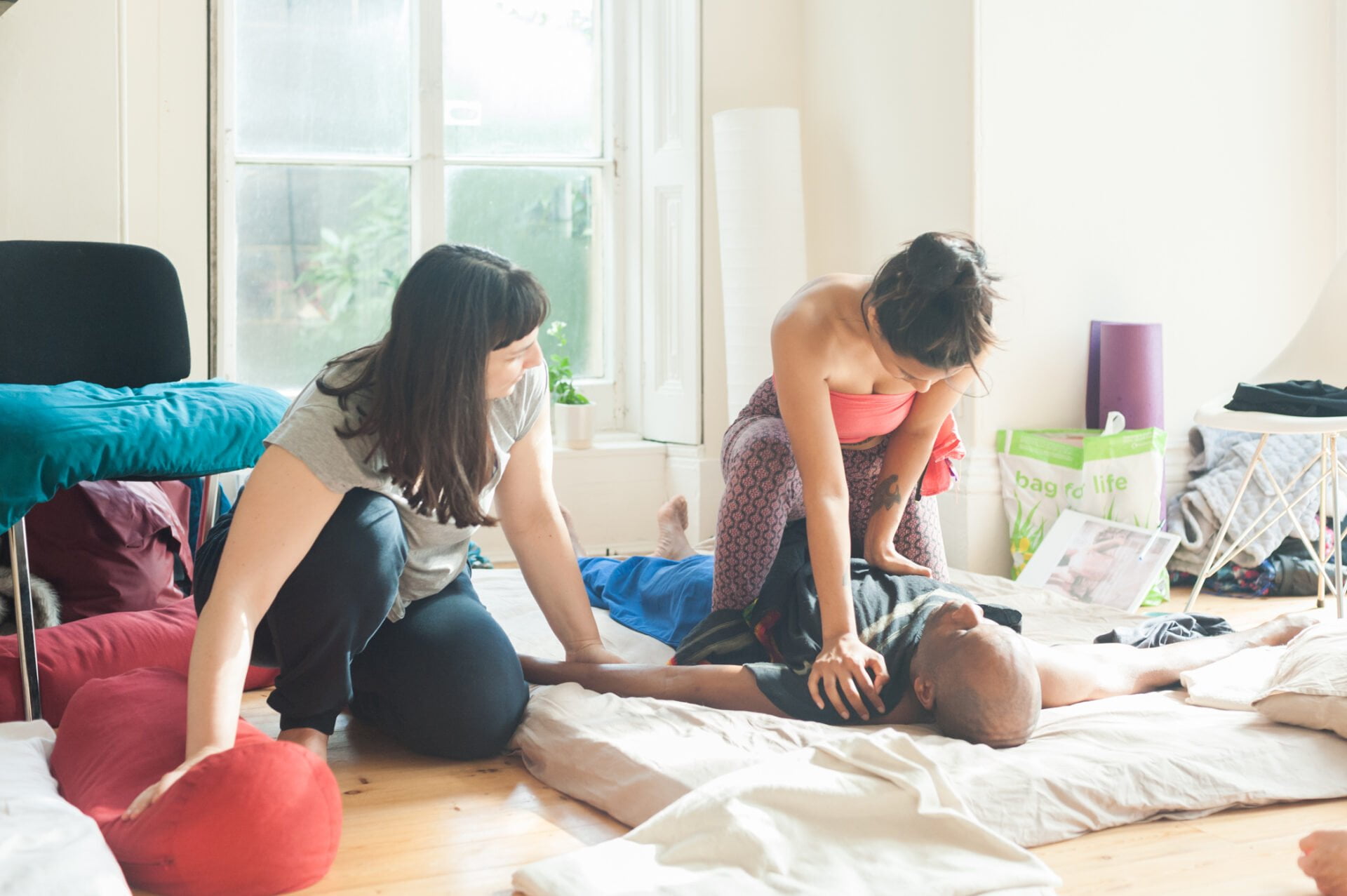Our new therapist training price structure, and concession rates
After a few years of teaching, and supporting hundreds of students in setting up their AYM/wellness businesses, I have decided to change our price structure. The workshop prices will stay the same, but we will offer concession rates for people in financial difficulty, after agreement with the hosting yoga centres.
Our current therapist training price structure
We are currently charging £350 per level for Levels 1-3, and £250 for Level 4. Each level includes: 15 hours of class contact time, several hours of online videos (the entire practical training, and more), 2 hours of mentorship via videocall, 1 year membership of our therapist association, and our lifetime support whenever you need us!
Concession rates are: £300 per level for L1-3, and £200 for L4.
What we are doing to keep AYM trainings affordable
Our mission as a school is to make high quality AYM treatments and trainings as widely available and accessible as possible, raising awareness of AYM as a method, and making AYM treatments available for as many people as possible, so all can share in the benefits of this wonderful method. Our trainings are intentionally kept as low cost as possible to help us achieve this, and thus represent excellent value, as our students keep telling us!
So how do we do it? We are constantly trying to find more efficient ways to lower our costs, while also ensuring that none of our staff, people we collaborate with/rent spaces from, suppliers or producers of the products we use are exploited, and we support ethical businesses wherever possible. And of course, to maintain the highest possible standards of training, and post-training support for our students.
We do:
- Invest in the quality of our online resources, to maximise the value of the training to our students, and we are always building up and adding to our online resources.
- Keep group sizes small, which might seem counter-intuitive, but it allows us to really personalise instruction, so that each student makes the most every minute they spend in the classroom with Despina.
- Offer weekly mentorship sessions on videocall and a lot of flexibility as to the times of the mentorship sessions, so that every student can attend, and make sure that they are making the most out of their self study and learning from their practice in-between their practical AYM trainings.
- We spend time and resources finding and building collaborations with spaces, so we gain access to spaces that are appropriate for our trainings, and well located, at reasonable prices.
- We have never offered discounts for paying for several levels of training in one go, as that would mostly benefit our students from wealthier backgrounds. Instead, we try to keep our prices as low as possible for all our students.
- Students from disadvantaged socioeconomic backgrounds are usually less inclined to risk investing in vocational training. By making it easier for our students to commit to as little as one level at a time and not charging them more for that privilege, we are reducing the financial risk involved.
- Our training is modular, including the AYM technique training, and also additional supporting training in yoga anatomy, physiology and pathology; social media and marketing; and our mentorship scheme, so that students can sign up and pay only for the parts of the training that they need, are excited about, and have not covered before in previous trainings.
- We have created amazing collaborations with well qualified teachers who offer excellent quality trainings, so our students get discounted rates on everything they need to learn around the AYM technique to improve and develop their practice.
What we are changing
Up to February 2022, we were charging a little more in trainings in London and Bristol, and a little less in Leeds and Glasgow, on the grounds that (i) the venues that we rent for the trainings are more expensive (by necessity) in London and Bristol, while in Leeds and Glasgow we can find more affordable venues, and mainly because (ii) AYM is a premium product, so as long as we have access to high income clients as AYM therapists, even early on in our careers, we can charge decent prices for our treatments (and pay our therapist training fees installments!). In London and Bristol there are more people on high incomes, and also more of a culture of investing in our wellbeing. When time is money, paying a little more for a more effective treatment, where clients can feel more benefit in shorter amounts of time, makes perfect sense.
What I realised in the past few years, after training hundreds of students, is that where a student lives is less related to whether they have access to clients who can afford to pay for AYM treatments, than they student’s socioeconomic background (see paragraph on this below).
So after careful consideration, I will now make the lower (previously Leeds/Glasgow) price available to low income students everywhere, and the full price will also be the same everywhere. The trainings are still excellent value, given the quality of the teaching, emphasis on developing our students’ intuition as therapists, our supporting materials (manuals and videos), small group sizes, personalised support offered to all our alumni, and that we are teaching you a skill which is highly valued by high income clients.
But at the same time, anyone who is on benefits, or from a disadvantaged socioeconomic background, a refugee, or facing financial difficulties for a different reason at the moment, can access a concession rate, as well as a personalised, interest free installment plan (available to all our students, just tell us how much you want to spread out your payments and we’ll make a plan for you). Just get in touch, let us know what your situation is (this will be strictly confidential between you and me) and we will make arrangements with you regarding a concession price, a reduced deposit if you need it and a payment plan that works for you. Read more about our installment plans in our Frequently Asked Questions.
What is the importance of our graduates being able to charge decent rates?
We have written about this in our Frequently Asked Questions.. In short, we want our therapists (and everyone else) to have a good life, and also nobody wants treatments with an overworked therapist! If therapists don’t change decent rates eventually they might become overworked to the extent that they need to change professions.
How do we make treatments available to people on low incomes?
This is a separate issue, which we have also covered in our Frequently Asked Questions. Our students, and we as a school, do our best to ensure as many people as possible can receive AYM treatments when they need them.
Why charge students from disadvantaged socioeconomic backgrounds less, when they are getting trained in the same, highly desirable skill as our wealthier students?
After a few years of teaching, and supporting hundreds of students in setting up their AYM/wellness businesses, I have observed that, irrespective of where they live, our wealthier students can generally set up successful and profitable businesses very easily. All our graduates can offer amazing treatments, but our wealthier students can also invest in beautiful treatment spaces immediately after their training, they know how to reach clients who can easily afford to invest in their wellbeing and they can afford to invest in their initial publicity. Conversely, having tried for years to help some of our lower income students come out of poverty and charge decent rates for their treatments, there has been quite a bit of resistance.
I have been trying to help, and at the same time understand what the limitations are.
- Risk taking and initial investment in publicity: students who are happy to take some financial risks usually do better (e.g. offer discounted treatments at the beginning when building their client base, offer discounted treatments to local influencers, use a company that finds them clients for a fee, but then they don’t have to pay if the clients return as regulars etc.). We find that lower income students often find it more difficult to make those little investments/take those risks.
- Extended networks: our first clients are often our friends and family, who in turn recommend us to their friends and family and so on. It does help if lots of people in our extended network can afford to have regular treatments!
- Treatment spaces: Even when I manage to make beautiful treatment spaces in great locations available at a low cost, some students find it difficult to get the word about their treatments out to clients who can afford to pay a fair price to the therapist for the treatment, and a small amount to cover the room rent on top (and with the current economic client, this is an ever diminishing proportion of the population). Well off clients often expect the treatment spaces to be inviting, professional looking, centrally located, have parking available or be near main public transport junctions etc, but therapists are unlikely to invest in such spaces unless they already have a small client base, or are optimistic that their investment in their initial publicity will pay off.
- Marketing skills: therapists who come from wealther backgrounds already know who their potential clients are, what the client expectations are (other than an amazingly effective treatment), what language to use to communicate what we can offer to them, and how the information that our treatments are available can reach them. Some of our lower income students are also good at these marketing and communication skills irrespective of their backgrounds, but not all. We now offer low cost marketing and social media training to our graduates, as well as personalised mentorship for a very low cost, and often for free, just to see how we can get all our students to have a good understanding of how word about their practice can spread.
- Social factors: most people are more comfortable around other people from similar socioeconomic backgrounds. There are clear exceptions to this, some of our graduates and of our clients clearly feel comfortable and are able to connect easily with people from any background. But the reality for most of our therapists is that if they themselves, and most of their friends and families, are from a low income background, they will be more likely to attract (and want to offer treatments to) clients from the same background. And those clients will not be able to afford to pay the kind of rates for regular treatments that will enable their therapist to have a good life and continue their training without overworking.
Our advice to low income students
If you are still really concerned about attending a therapist training with us because of the cost, please do get in touch, especially if you are thinking that you might end up offering low cost treatments to low income clients, or volunteering. We do understand that the training fees represent substantial amounts for someone on a low income, and some prospective students might be worried about taking the financial risk to start training. One way to help you understand to what extent offering Ayurvedic Yoga Massage treatments would be beneficial for you, is to attend one of our 4-hour workshops. If it seems like offering AYM would be beneficial, then talk to Despina about committing to a Level 1 training, see how that works for you and take it from there.
With love, always,
Despina

